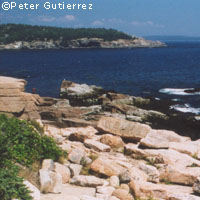Urgent action needed to save Europe's seas, say scientists
Europe's seas are in a state of serious decline and urgent action is needed to prevent further damage. This is the stark warning from a report by the European Lifestyles and Marine Ecosystems (ELME) project, which was funded by the EU through the Sixth Framework Programme (FP6). The project, which brought together researchers from 28 institutions in 15 countries, studied four major European seas: the Baltic Sea, the Black Sea, the Mediterranean Sea and the North-East Atlantic. Their goal was to see how recent economic and political changes in Europe, such as the enlargement of the EU and rapid economic growth, had affected European lifestyles, and how these lifestyle changes were affecting European seas. For each sea, the scientists looked at four environmental issues: habitat change, eutrophication (over-fertilisation of the sea), chemical pollution and fishing. They then created models linking economic and social drivers with these environmental pressures. These models were then used to predict what is likely to happen in the coming decades under different models of social and economic development. 'In every sea, we found serious damage related to the accelerated pace of coastal development, the way we transport our goods and the way we produce our food on land as well as the sea,' said project coordinator Professor Laurence Mee of the Marine Institute at the University of Portsmouth. 'Without a concerted effort to integrate protection of the sea into Europe's development plans, its biodiversity and resources will be lost.' For each sea, the scientists identified 'winners' and 'losers'. 'In almost every case the winners are either species that are low in the food chain or opportunistic, undesirable species,' the report states. Eutrophication is a problem in all the seas studied, but the enclosed seas (the Baltic and Black Seas and, within the Mediterranean, the Adriatic Sea) are the worst affected. Food production is the principle cause of eutrophication, which takes place when excess nutrients get into the sea. Unfortunately, lifestyle changes mean this problem is likely to get worse; as people get richer, they tend to eat more meat, and meat production requires more land than vegetable or grain production. 'Without major changes in agricultural practice greater protein consumption will raise nutrient discharges to water bodies,' the report states. Furthermore, the intensification of livestock farming, particularly in Eastern Europe, is also likely to see increased amounts of ammonia being released into the environment. Increased wealth is also linked to habitat loss. 'Increased wealth and personal mobility have led to growth of coastal populations and resource use,' the report reads. Developments along the coastline have led to the loss of many coastal and near-shore habitats. However, in addition to their environmental importance, these ecosystems are often important tourist attractions, so their loss could have severe economic implications. Shipping and transport also affect the marine ecosystem by giving alien species a ride into new seas. These 'invasive' species often compete with and replace native species. The Common Fisheries Policy is the main driver behind changes in fishing effort, through the Total Allowable Catch (TAC) and other subsidies and support schemes. The scientists found, however, that managing fisheries in isolation from other environmental issues is unlikely to lead to overall sustainability. On chemicals, an area of particular concern is 'lifestyle chemicals' associated with household products. These regularly find their way into the environment, even though many are known to have toxic effects. However, little is known about where these chemicals go once they are in the environment, or what happens when they are combined in complex mixtures. 'There are urgent challenges to be addressed if the concept of ecosystem-based management espoused in the draft EU Marine Strategy Directive and the Maritime Policy Green Paper is to be implemented,' the report concludes. 'Our 'business-as-usual' scenario suggests that failure to take additional action to support the comprehensive assessment and management of each regional sea will result in continued degradation and loss of opportunity.' The scientists also call on policy makers to be ready to meet new, unexpected challenges, noting: 'It is important to ensure that future marine policy is not restricted to well established pressures and state changes, but continues to employ horizon scanning as a means of recognising the range of uncertainties that the future may bring.'

